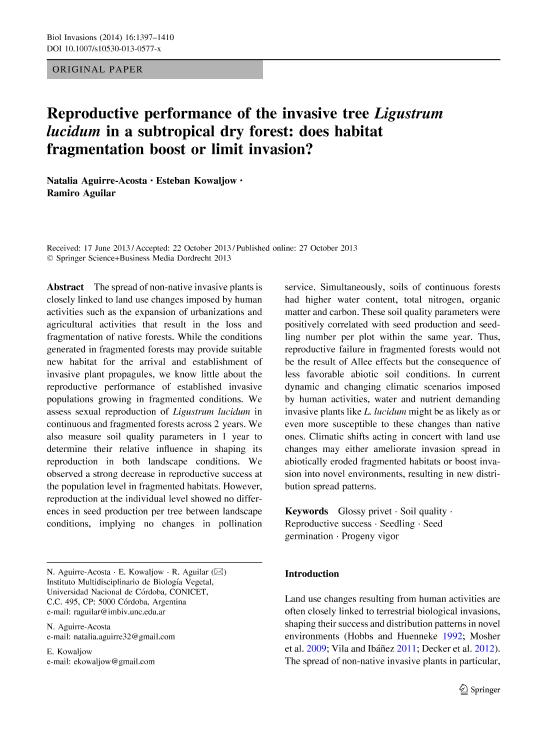Mostrar el registro sencillo del ítem
dc.contributor.author
Aguirre Acosta, Natalia

dc.contributor.author
Kowaljow, Esteban

dc.contributor.author
Aguilar, Ramiro

dc.date.available
2017-04-03T19:46:02Z
dc.date.issued
2014-07
dc.identifier.citation
Aguirre Acosta, Natalia; Kowaljow, Esteban; Aguilar, Ramiro; Reproductive performance of the invasive tree Ligustrum lucidum in a subtropical dry forest: Does habitat fragmentation boost or limit invasion?; Springer; Biological Invasions; 16; 7; 7-2014; 1397-1410
dc.identifier.issn
1387-3547
dc.identifier.uri
http://hdl.handle.net/11336/14727
dc.description.abstract
The spread of non-native invasive plants is closely linked to land use changes imposed by human activities such as the expansion of urbanizations and agricultural activities that result in the loss and fragmentation of native forests. While the conditions generated in fragmented forests may provide suitable new habitat for the arrival and establishment of invasive plant propagules, we know little about the reproductive performance of established invasive populations growing in fragmented conditions. We assess sexual reproduction of Ligustrum lucidum in continuous and fragmented forests across two years. We also measure soil quality parameters in one year to determine their relative influence in shaping its reproduction in both landscape conditions. We observed a strong decrease in reproductive success at the population level in fragmented habitats. However, reproduction at the individual level showed no differences in seed production per tree between landscape conditions, implying no changes in pollination service. Simultaneously, soils of continuous forests had higher water content, total nitrogen, organic matter and carbon. These soil quality parameters were positively correlated with seed production and seedling number per plot within the same year. Thus, reproductive failure in fragmented forests would not be the result of Allee effects but the consequence of less favorable abiotic soil conditions. In current dynamic and changing climatic scenarios imposed by human activities, water and nutrient demanding invasive plants like L. lucidum might be as likely as or even more susceptible to these changes than native ones. Climatic shifts acting in concert with land use changes may either ameliorate invasion spread in abiotically eroded fragmented habitats or boost invasion into novel environments, resulting in new distribution spread patterns.
dc.format
application/pdf
dc.language.iso
eng
dc.publisher
Springer

dc.rights
info:eu-repo/semantics/openAccess
dc.rights.uri
https://creativecommons.org/licenses/by-nc-sa/2.5/ar/
dc.subject
Glossy Privet
dc.subject
Soil Quality
dc.subject
Reproductive Success
dc.subject
Seedling
dc.subject
Seed Germination
dc.subject
Progeny Vigor
dc.subject.classification
Ecología

dc.subject.classification
Ciencias Biológicas

dc.subject.classification
CIENCIAS NATURALES Y EXACTAS

dc.title
Reproductive performance of the invasive tree Ligustrum lucidum in a subtropical dry forest: Does habitat fragmentation boost or limit invasion?
dc.type
info:eu-repo/semantics/article
dc.type
info:ar-repo/semantics/artículo
dc.type
info:eu-repo/semantics/publishedVersion
dc.date.updated
2017-03-30T18:24:27Z
dc.identifier.eissn
1573-1464
dc.journal.volume
16
dc.journal.number
7
dc.journal.pagination
1397-1410
dc.journal.pais
Alemania

dc.journal.ciudad
Berlin
dc.description.fil
Fil: Aguirre Acosta, Natalia. Consejo Nacional de Investigaciones Científicas y Técnicas. Centro Científico Tecnológico Córdoba. Instituto Multidisciplinario de Biología Vegetal (p); Argentina; Argentina. Universidad Nacional de Córdoba; Argentina
dc.description.fil
Fil: Kowaljow, Esteban. Consejo Nacional de Investigaciones Científicas y Técnicas. Centro Científico Tecnológico Córdoba. Instituto Multidisciplinario de Biología Vegetal (p); Argentina; Argentina. Universidad Nacional de Córdoba; Argentina
dc.description.fil
Fil: Aguilar, Ramiro. Consejo Nacional de Investigaciones Científicas y Técnicas. Centro Científico Tecnológico Córdoba. Instituto Multidisciplinario de Biología Vegetal (p); Argentina; Argentina. Universidad Nacional de Córdoba; Argentina
dc.journal.title
Biological Invasions

dc.relation.alternativeid
info:eu-repo/semantics/altIdentifier/url/http://link.springer.com/article/10.1007%2Fs10530-013-0577-x
dc.relation.alternativeid
info:eu-repo/semantics/altIdentifier/doi/http://dx.doi.org/10.1007/s10530-013-0577-x
Archivos asociados
